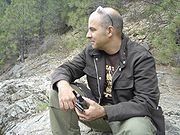
Eric Paulos
Encyclopedia

United States
The United States of America is a federal constitutional republic comprising fifty states and a federal district...
computer scientist
Computer scientist
A computer scientist is a scientist who has acquired knowledge of computer science, the study of the theoretical foundations of information and computation and their application in computer systems....
, artist
Artist
An artist is a person engaged in one or more of any of a broad spectrum of activities related to creating art, practicing the arts and/or demonstrating an art. The common usage in both everyday speech and academic discourse is a practitioner in the visual arts only...
, and inventor, best known for his early work on internet
Internet
The Internet is a global system of interconnected computer networks that use the standard Internet protocol suite to serve billions of users worldwide...
robotic teleoperation
Teleoperation
Teleoperation indicates operation of a machine at a distance. It is similar in meaning to the phrase "remote control" but is usually encountered in research, academic and technical environments...
and is considered a founder of the field of Urban Computing
Urban computing
Urban computing is an emerging field of study that focuses on the use of technology in public environments such as cities, parks, forests and suburbs...
. Dr. Paulos is the Director of the Living Environments Lab and an Assistant Professor in the Human-Computer Interaction Institute with a secondary faculty appointment in the Robotics Institute both within the School of Computer Science at Carnegie Mellon University. Previously he was senior research scientist at Intel Research in Berkeley, CA, where he joined the staff in 2002 and founded the Urban Atmospheres research group - challenged to employ innovative methods to explore urban life and the future fabric of emerging technologies across public urban landscapes. Dr Paulos' areas of expertise span a deep body of research territory in urban computing, sustainability, green design, environmental awareness, social telepresence, robotics, physical computing, interaction design, persuasive technologies, and intimate media. Eric is a leading figure in the field of urban computing and is a regular contributor, editorial board member, and reviewer for numerous professional journals and conferences. His published work is primarily in the areas of Robotics
Robotics
Robotics is the branch of technology that deals with the design, construction, operation, structural disposition, manufacture and application of robots...
, Urban Computing
Urban computing
Urban computing is an emerging field of study that focuses on the use of technology in public environments such as cities, parks, forests and suburbs...
, Human-Computer Interaction, Computer supported cooperative work
Computer supported cooperative work
The term computer-supported cooperative work was first coined by Irene Greif and Paul M. Cashman in 1984, at a workshop attended by individuals interested in using technology to support people in their work. At about this same time, in 1987 Dr...
, and Ubicomp. He received his PhD in Electrical Engineering and Computer Science from UC Berkeley where he helped launch a new robotic industry by developing some of the first internet tele-operated robots including Space Browsing helium filled blimps and Personal Roving Presence devices (PRoPs).
Born and raised in California
California
California is a state located on the West Coast of the United States. It is by far the most populous U.S. state, and the third-largest by land area...
, Eric received a B.S.
Bachelor of Science
A Bachelor of Science is an undergraduate academic degree awarded for completed courses that generally last three to five years .-Australia:In Australia, the BSc is a 3 year degree, offered from 1st year on...
, M.S.
Master of Science
A Master of Science is a postgraduate academic master's degree awarded by universities in many countries. The degree is typically studied for in the sciences including the social sciences.-Brazil, Argentina and Uruguay:...
, and Ph.D.
Ph.D.
A Ph.D. is a Doctor of Philosophy, an academic degree.Ph.D. may also refer to:* Ph.D. , a 1980s British group*Piled Higher and Deeper, a web comic strip*PhD: Phantasy Degree, a Korean comic series* PhD Docbook renderer, an XML renderer...
in Electrical Engineering
Electrical engineering
Electrical engineering is a field of engineering that generally deals with the study and application of electricity, electronics and electromagnetism. The field first became an identifiable occupation in the late nineteenth century after commercialization of the electric telegraph and electrical...
and Computer Science
Computer science
Computer science or computing science is the study of the theoretical foundations of information and computation and of practical techniques for their implementation and application in computer systems...
from the University of California, Berkeley
University of California, Berkeley
The University of California, Berkeley , is a teaching and research university established in 1868 and located in Berkeley, California, USA...
, completing his Ph.D. in 2001. Eric has also collaborated with Mark Pauline
Mark Pauline
Mark Pauline is an American performance artist and inventor, best known as founder and director of Survival Research Labs. He is a 1977 graduate of Eckerd College in St. Petersburg, Florida....
of Survival Research Laboratories
Survival Research Laboratories
Survival Research Laboratories is a machine performance art group credited for pioneering the genre of large-scale machine performance. After about 30 years in San Francisco, California, SRL spent most of 2008 moving to Petaluma, California....
since 1994.
In September 2008, Eric joined the faculty at Carnegie Mellon University
Carnegie Mellon University
Carnegie Mellon University is a private research university in Pittsburgh, Pennsylvania, United States....
's Human-Computer Interaction Institute where he founded a new lab, the Living Environments Lab, to explore environmental issues and sustainability scoped within HCI
HCI
HCI may refer to:- Computing :* Home Computer Initiative, a United Kingdom government programme designed to increase the use of computers in the home...
and Ubicomp research.
Selected bibliography
- Paulos, E. and Canny J. 1998. PRoP: Personal Roving Presence. ACM SIGCHI, 296 - 303.
- Paulos, E. and Canny J. 2000. Personal Tele-embodiment: Reconstructing the Body for Online Interaction in The Robot in the Garden: Telerobotics and Telepistemonogy on the Internet, Cambridge: MIT Press.
- Paulos, E. and Canny J. 2001. Social Tele-embodiment: Understanding Presence. Autonomous Robots, 11(1), 87-95.
- Paulos, E. and Goodman, E. 2004. The Familiar Stranger: Anxiety, Comfort, and Play in Public Places. ACM SIGCHI, 223-230.

